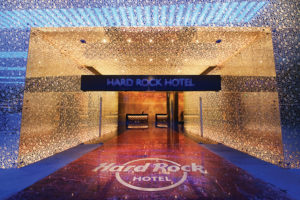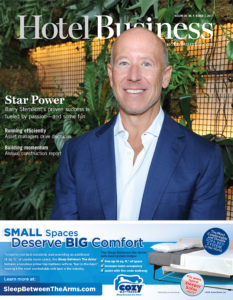ORLANDO—As Japan’s government continues to pave the way for international gaming companies to open casinos in the country, Hard Rock International’s intentions to swipe its share are becoming more apparent through the opening of a division in the island nation and tapping an industry veteran with more than 30 years behind him as the unit’s CEO.
Speaking to Hotel Business after returning from an annual trip where Hard Rock executives discuss the company’s goals, pipeline and financials from the year prior, Edward Tracy, the Japan division’s newly appointed leader, said, “I was most encouraged by the vision of the company and its dedication to not only the team, but the quality of the products they’re putting out.” For him, Hard Rock’s messaging is clear: It’s focused on all the right things going forward.
Tracy was president and CEO of Sands China Ltd. before joining the Hard Rock family. He retired from the integrated resort developer and operator in January 2015, citing both his family and health as reasons for his departure from the company. “I had to work through some fairly significant health issues, which, knock on wood, I worked my way through with the help of the Cleveland Clinic and a good team of doctors,” he said. After stepping down from his post, he stayed on as an advisor to the board of directors.
In addition to focusing primarily on improving his health situation, he had the opportunity over the past couple of years to take a step back to catch up with his family; during the latter part of this time period, however, he could also sense his wife was getting just about ready for him to pick up his suitcase and head back to work. “As my wife said, ‘I married you for better or for worse, but not necessarily for lunch,’” Tracy said jokingly.
While he was recovering, a number of companies had offered him the opportunity to go back to Macau, China, but “neither my wife nor I felt it was the right thing for us—for personal reasons,” he said. Conversations with Hard Rock’s chairman Jim Allen—whom Tracy has known since his days at the Trump Organization, serving as CEO—about the position began months ago. “He asked if I’d be interested in helping him because of my integrated resort experience and my experience in Asia—and, of course, we did a significant amount of business in Japan as well as in China,” Tracy said. “At the end, we had a couple of very long conversations about it, and we came to an agreement.”
In his eyes, Japan is an “extraordinary opportunity” for Hard Rock. “Japan’s probably what Macau was 13 or 14 years ago when the government decided to break up the monopoly in Macau and bring in Western gaming companies,” Tracy said. “To be on the ground floor of that in Japan at this time in history is a once-in-a-lifetime opportunity.”
Fairly recently, Japan’s parliament approved a bill essentially enabling the legalization of casino gambling in the country by allowing the opening of casino resorts for the purposes of increasing tourism and development of local economies. While the bill’s implementation is still unclear—another bill outlining the number and locations of gaming resorts still needs to be drafted and passed—Hard Rock is betting its money on its ability to acquire the licenses required to open up a gaming facility in the region.
With additional legislation pending, Tracy’s responsibilities and initiatives remain somewhat in limbo—particularly with regard to how the country will move forward on licensing. “That process is going to give us a whole lot more information about how we approach this competition for licenses in Japan,” he said. His main focus in the foreseeable future is going to be more on the development side.
Tracy, who will be spending the majority of his time in Japan to limit the back-and-forth traveling, expects there to be “some tough competition—obviously, some successful developers and operators are going to be bidding for these licenses,” he noted. “Hard Rock’s brand and business integrity will help us develop a really successful plan and an opportunity to create really terrific business in Japan.” Not only will he face roadblocks on the regulatory side of things, but cultural differences will come into play.
“I think you have to be a good listener in any country where you’re the visitor and they’re the host,” he said, providing insight on cultural diversity. “I think it’s a mistake that has been made over and over again, in particular, in my view, by American operators, who aren’t as good listeners as they need to be. If you’re prepared to listen you’ll generally be told everything you need to know about how to proceed. That’s done through very high levels of communication, not only top-down but bottom-up. Understanding how to communicate with common denominator issues is extremely important.”
Backed up by the financial wherewithal and a very strong corporate desire to take advantage of the opportunity to expand the footprint all over Asia, Hard Rock’s growth plans into Japan are aggressive, Tracy noted, pointing out the increasing number of Hard Rock Cafes and Hard Rock Hotels in the region. Specifically, there are four or five hotels in the works in China; these properties will be the brand’s first hotels in Mainland China.
Whether a property is located in Macau or Tokyo, success in the industry—providing professional hospitality services for a profit—depends on being able to effectively satisfy guests, empower employees and assure stakeholders. “My view is if you understand the fundamentals of the business and you execute on them, you’re really not going to see a whole lot of differences,” he said. HB


